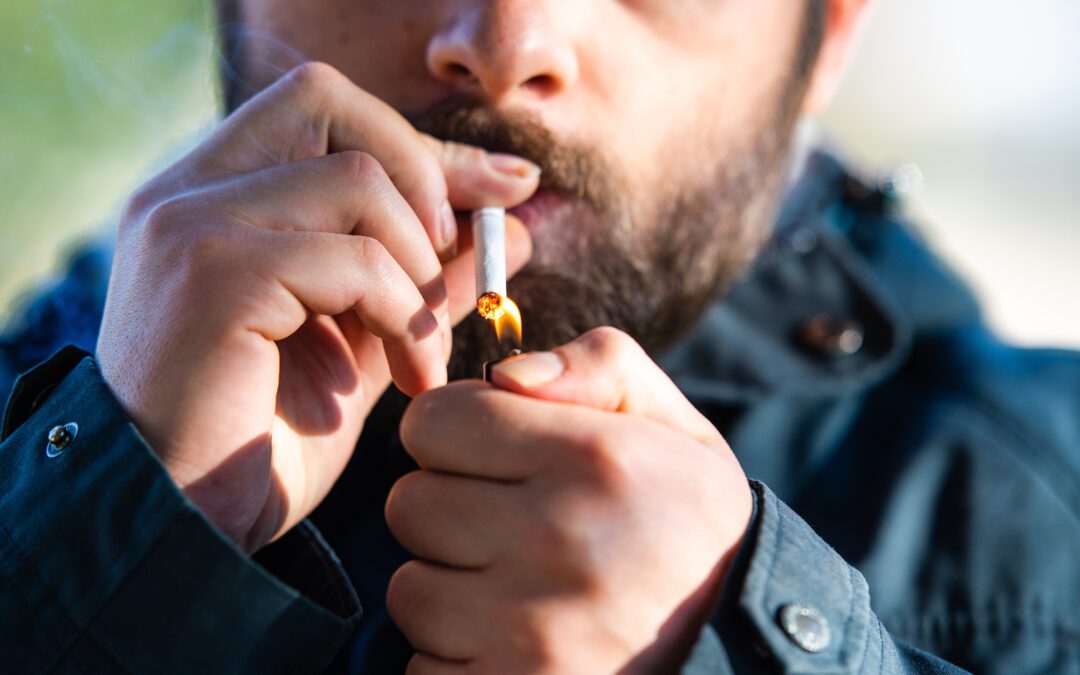It’s a popular culture cliché: images of people smoking in a 12-step meeting or even while getting treatment in a recovery center. And like many clichés, there’s some truth in that image—maybe even a lot of truth.
For example, a 2015 research article points out that, “[A] recent review of 42 empirical papers on addiction treatment programs for multiple substances from 1989 through 2005 found that the prevalence of tobacco use among persons in recovery ranged between 65% and 87.2%.”
When compared to just over 18% of the general population that smoked in 2012, it is abundantly clear that smoking in recovery is surprisingly common.
For that reason, many recovery centers—including Wooded Glen Recovery Center—allow patients to smoke while in treatment. Among the pressing priorities addressed during treatment, cigarette smoking tends not to rank very high.
But that doesn’t make smoking—in treatment, after treatment, or really at all—a good idea. Let’s take a look at the many reasons you may want to buck the trend and be a non-smoker in recovery.
There Are Plenty of Reasons to Stub Out Smoking – Starting With Your Health
Let’s get the obvious reason to quit smoking out of the way first. It is no secret that smoking can lead to a number of devastating lung diseases, circulation issues, other conditions that have bad outcomes—including death. Quitting significantly decreases your risk of these outcomes, and the sooner you quit the better.
Even if smoking does not lead directly to a disease or death in your case, it can still make you look (and feel) older than you are. And even if you are not vain about your appearance, odds are you are in no hurry to start looking like you have celebrated more birthdays than you actually have. The additional wrinkles you may find on your face and the staining of your teeth—not to mention the smell of smoke that lingers in your hair and clothes—do not contribute to a youthful, healthy image.
Not Worried About Your Health Right Now? Some Other Things to Consider
Let’s say that the physical dangers of smoking just don’t move you at the moment. If you are in the grips of a mental health disorder and/or a substance use disorder, the potential medical consequences of smoking may not seem important. Still, once your health stabilizes and you feel more settled in your recovery, you may want to consider these additional reasons to give up smoking.
For one, your smoking may well be harming the people or pets you love. Secondhand smoke is a true danger to others—especially those you live with because they have so much exposure. Studies show, for example, that a non-smoker living with a spouse who smokes is 25 percent more likely to develop lung cancer than a non-smoker living with another non-smoker.
Smoking can also isolate you socially. Because such a small percentage of the population smokes and smoking is banned in nearly all public places, smokers are often forced into uncomfortable and inconvenient designated smoking areas—almost always outside and seldom offering any protection from the weather. Building strong social connections that can support your sobriety is extremely important, and smoking can make that more difficult as moments you could spend with your friends and family are lost to smoking.
There is also the financial side of things to think about. Cigarettes are expensive, and the worse your habit, the more you will spend. You could be using that money for any number of things that would make your life more enjoyable and help support sobriety. You might think of the money you spend on cigarettes as a personal indulgence to which you are entitled. That is just fine. After all, we all deserve to treat ourselves now and again. But is smoking really the treat you are looking for? Given the downsides, there are so many better options for your personal spending.
And Let’s Not Forget: Nicotine Is Addictive
Perhaps the greatest irony of all the smoking being done by folks in treatment and recovery for addiction is that nicotine itself—a key ingredient in cigarettes—is extremely addictive. If the purpose of treatment is to overcome addiction and live a life of sobriety, sticking with cigarettes simply does not make a great deal of sense. Smoking may not be the most urgent issue in your life, but that does not mean it should just be ignored. The dangers of smoking are just too numerous to let slide over the long term.
We Can Help You Let Your Substance Use Go Up In Smoke
At Wooded Glen Recovery Center, we want to help you leave substance use—including the nicotine found in cigarettes—behind you. We are prepared to create a personalized treatment plan that will address any and all substances you might be struggling with. And we are also equipped to address any co-occurring mental health disorders—from depression and anxiety to PTSD and other trauma-related issues—that may be contributing to your substance use disorder. We are ready to help with expertise and compassion.

